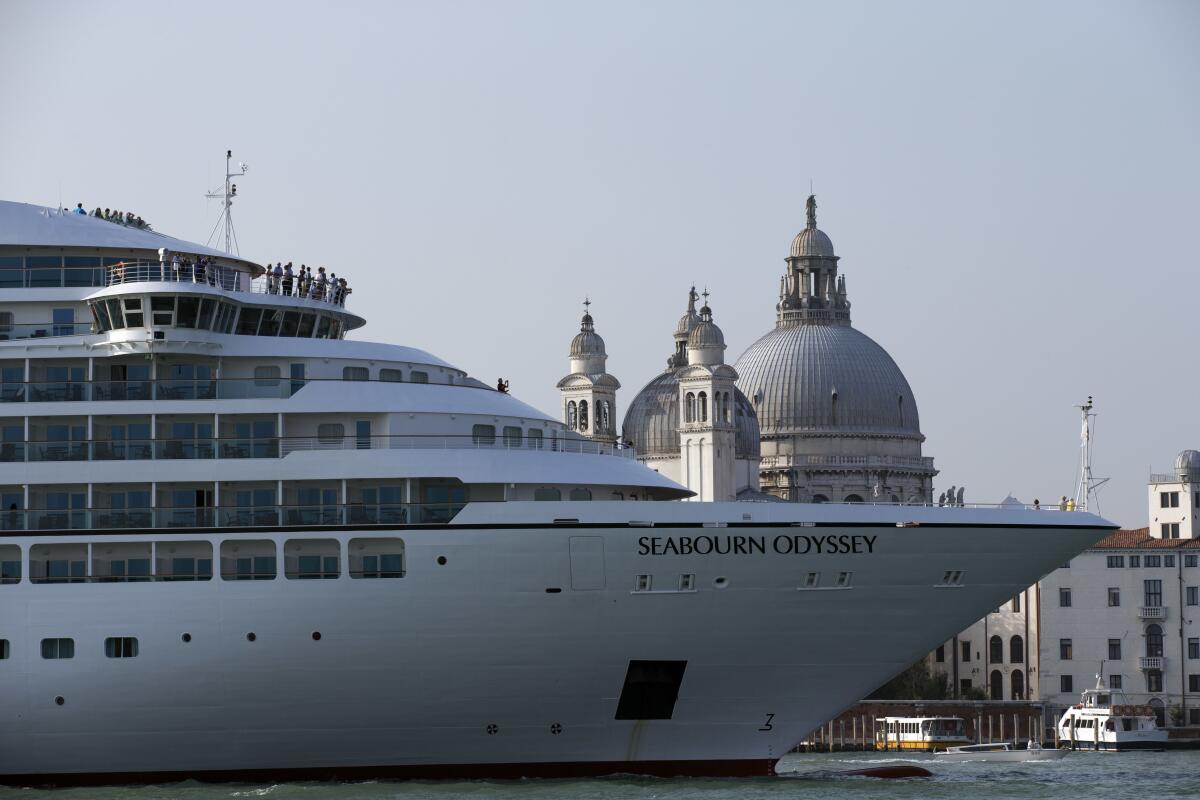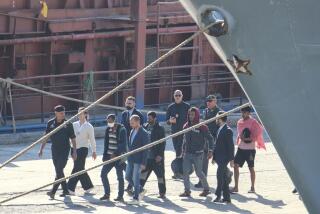UNESCO calls Italy’s ban on cruise ships in Venice ‘good news’

- Share via
ROME — The United Nations culture agency, which was considering declaring Venice an imperiled World Heritage Site, on Wednesday hailed Italy’s ban on big cruise ships in the heart of the lagoon city.
UNESCO Director-General Audrey Azoulay tweeted that the Italian government’s Tuesday decision to deny access to the mammoth liners as of Aug. 1 is “very good news and an important step that significantly contributes to the safeguarding of this unique heritage site.”
Starting next month, ships over a certain size or weight or surpassing specific pollution levels can no longer ply the Giudecca Canal, a major sea artery in Venice, or cruise the waters near St. Mark’s Square, the historic heart of the environmentally fragile city.
Until a permanent docking place can be selected and developed for the big cruise ships, the liners will be permitted to pull up in Marghera, an industrial suburb of Venice.
UNESCO, which is based in Paris, recommended last month adding Venice to its list of World Heritage in Danger sites.
While the Italian government announced the ban with a nervous eye on UNESCO, Venice remains on the agenda of the World Heritage Committee’s meeting this month in Fuzhou, China, the U.N. agency indicated.
For years, protesters hoisting signs proclaiming “No Big Ships” have demonstrated in Venice, sometimes taking to small boats to sail close to the cruise liners, which to people onshore look like lumbering giants slicing through the city.
Perhaps surprisingly, among those praising the Italian government’s move was a cruise industry trade association.
“As an industry, we are very positive. We welcome the decision by the government,” said Francesco Galietti, Italy director for the Cruise Lines International Assn.
Galietti said the trade group had been advocating for an alternative to the Giudecca Canal for some 10 years and therefore was happy the government has promised to find a permanent alternative docking area for the big cruise ships.
“We never wanted to stick to the Giudecca,” he said, discounting activists’ claims of cruise line company resistance.
“The negative damage this [publicity] causes to the industry is way bigger than the experience” of individual passengers savoring the thrill of sailing into the canal, Galietti said.
As for any logistical problems the ban might pose for imminent cruise itineraries, that wasn’t immediately clear.
Galietti said that with tourism struggling to regain steam after the COVID-19 pandemic restricted travel, many companies didn’t put Venice on their itineraries.
The Italian government, in a Cabinet decree approved Tuesday, allocated funds to compensate those whose tourist-heavy businesses might suffer from the ban, as well as money so Marghera can be temporarily used for docking until a permanent solution is found.
It also declared Venice’s Giudecca Canal and waterways near St. Mark’s a “national monument” in urgent need of safeguarding.
The Italian Environmental Fund, or FAI, was among the groups that long lobbied for the ban. It received the government’s move with mixed sentiments.
“We’re happy for Venice,” FAI President Andrea Carandini, a prominent Italian archaeologist and academic, told Italian newspaper Corriere della Sera. “But we’re not at all [happy] for the lagoon in its overall context.”
He said that to handle such big cruise ships, “it will be necessary to excavate canals. That means more water will enter the lagoon, thus an alteration of a complex system that’s clearly an entire one for Marghera and for Venice.”
Meanwhile, a conservation charity in Britain dedicated to Venice’s considerable art works, monuments and buildings took a wait-and-see view of the ban.
“At Venice in Peril, we are in principle delighted with this news,” the charity said in a statement. It lamented, though, that on “too many previous occasions vested interests in Venice” and the surrounding Veneto region “have frustrated the good intentions of those who want to clear the lagoon of these hideous floating hotels posing as ships.”
More to Read
Sign up for Essential California
The most important California stories and recommendations in your inbox every morning.
You may occasionally receive promotional content from the Los Angeles Times.










